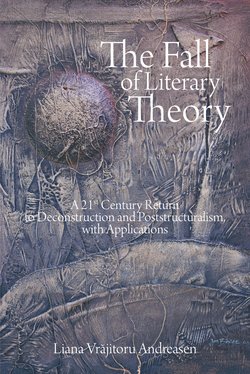Читать книгу The Fall of Literary Theory - Liana Vrajitoru Andreasen - Страница 10
На сайте Литреса книга снята с продажи.
ОглавлениеFREQUENTLY USED TERMS
Authenticity = The state of individuality before an assumed corruption. Corruption comes from an interaction with the social forces that alienate human beings from themselves. Existentialism in particular perceives alienation as a move away from identity, whereas authenticity is considered to be in strict correlation with identity. Following Lacan, I argue that authenticity is misunderstood as something that can be retrieved. Identity is defined through language, so that authenticity (as identity) cannot be retrieved because nobody can go back to the before-language.
Fall = I employ this concept using as a starting point the Judeo-Christian concept of the fall: the initial transgression of mankind that made all human beings sinners (i.e. not innocent). Through faith, individuals can be redeemed. The fall, however, has to be understood far beyond this religious framework. If one defines the fall as a loss of wholeness (based on Lacan’s theory), one can extend the concept to include any other loss that participates in the formation of identity and determines individuals to strive to achieve a lost wholeness.
Identity = Following Lacan’s concept of the “I” that recognizes itself as an entity, I explain identity as the sum total of the steps taken toward reaching a desired image of the self. These steps begin in childhood and continue throughout one’s life, without reaching the perfect image that would redeem one from the fall. Identity is conditioned by language, in the sense that it is within language that the perfect image is created and that the desire for identity operates.
Innocence = The state of human beings before the fall, as understood in Judeo-Christianity. On a more general level, innocence can be any state that is seen as prior to a transgression, a loss, or a fall. It is a state that is supposed to have been lost especially in the mythical fall and it is supposed to be the ideal identity to be retrieved by eliminating all transgressions from the social world. Such an understanding of innocence also underlies most utopian or essentialist conceptions of society.
Language = I am using Lacan’s and Derrida’s understanding of this concept. Language is not merely the totality of all words (or signifiers) that we use to communicate. It is also the network of relations resulting from individuals’ identification with signifiers that are believed to possess meaning. From birth, language conditions us to identify with the cultural signs surrounding us (based on how the family and all other institutions define these signs).
Meaning = In linguistic terms, it is the signified behind the signifier, something that is generally believed to be fully contained in language, fully defined, and having absolute presence. Deconstruction attacks the concept of meaning because it sees it as essentialist, founded on a belief that there is an ultimate truth behind the shifting signifiers of language.
The Other = As Lacan explains, the Other is an entity perceived as a primordial rival at the onset of desire and of identity formation. The Other is basically an illusion of alterity perceived as desired wholeness and as what the self has been alienated from in the fall from the real. This Other is projected either on real people or on signifiers in language, toward which the individual turns in order to find the lost wholeness. The Other is also the primordial rival and the source of self-aggression, which turns into violence toward those identified with Otherness.
The Real = In Lacan’s terminology, the real is the imagined place of wholeness. In my interpretation, it is also the space from which the individual “falls” in the formative alienation by which the individual enters language. The real is “recognized” only in retrospect, through language, so that it cannot be retrieved as something outside of language because it is conditioned by language.
The Social Space/Social System = The language-conditioned framework for the development of individuals and for the interactions between them. The social space is the effect and the cause of interactions between flawed identities, but assumes to possess the key to becoming exempt from these flaws. The social space is also the place where language operates by creating signifiers of individuality and by conditioning the interactions between individuals who take hold of signifiers in order to achieve a role in the social fabric.
The Subject (the social subject) = Lacan explains that the social world (thus language) contains individuals in such a way that they cannot identify themselves (recognize themselves as potentially possessing an identity) outside of language and the social space. Even the most authentic individuals still define their authenticity within a framework that offers them the signifiers for their identities.
Territory = I use this term to designate both a physical territory to which identities are attached, and territories that have become abstract but are still territories because identities are attached to them. What this means is that violence and conflict arise in the name of an identity (national, racial, ideological, material, and so on). People defend a territory because they identify with it: they believe that it will help them retrieve the space of wholeness from which they have fallen.
